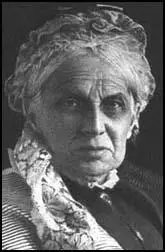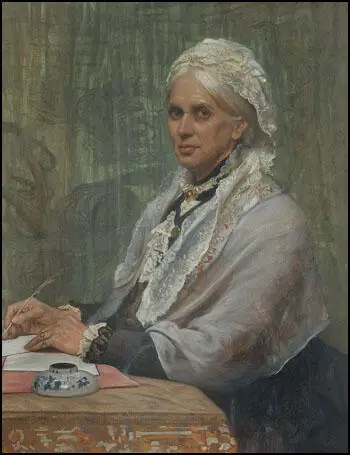Anne Clough

Anne Jemima Clough, the daughter of James Clough and Anne Perfect, was born in Liverpool on 20th January 1820. Two years later the family moved to Charleston in South Carolina.
In 1836 the family returned to Liverpool where James Clough became a cotton merchant. The three sons were sent to private schools but Anne was educated at home by her mother. Anne was particularly close to her brother Arthur Hugh Clough. Arthur, had been taught by Thomas Arnold at Rugby and won a scholarship to Balliol College, Cambridge. Arthur, who was later to become professor of English Literature at University College, London, took a keen interest in Anne's education. He directed her studies and under his influence she began to visit and teach the poor.
After James Clough's business failed in 1841, Anne opened a small school in Liverpool to help pay off the family debts. The school opened in January 1842 but it attracted few children. Anne had doubts about her abilities as a teacher and in May 1843, wrote in her journal: "I fear I mismanage the children; however, I must try to do better."
In 1852 Anne moved to the village of Ambleside where she opened a school for the children of local farmers and trades people. Anne's school was popular and she soon had enough children to employ two other teachers.
Devastated by the death of her brother, Arthur Hugh Clough, Anne gave up the running of her school. However, Anne's achievements in Ambleside were well-known and in 1864 she was contacted by Emily Davies who was involved in the campaign to improve the quality of women's education. Encouraged by Davies, Clough wrote an article, Hints on the Organization of Girls' Schools for Macmillan's Magazine.
In 1865 Clough joined Barbara Bodichon, Emily Davies, Francis Mary Buss, Dorothea Beale, Helen Taylor and Elizabeth Garrett at meetings of the Kensington Society. After the failure of Henry Fawcett and John Stuart Mill in 1867 to persuade Parliament to give women the same political rights as men, the women formed the London Society for Women's Suffrage. Soon afterwards similar societies were formed in other large towns in Britain. Eventually seventeen of these groups joined together to form the National Union of Women's Suffrage Societies.
Inspired by the success of the North London Collegiate School and Cheltenham Ladies College, Clough decided to form the North of England Council for Promoting the Higher Education of Women. The council held its first meeting at Leeds in 1867 and members included Josephine Butler, George Butler and Elizabeth Wolstenholme. Over the next few years the council developed a scheme of lectures and a university-based examination for women who wished to become teachers.

In 1871, Henry Sidgwick, who taught at Trinity College, established Newnham, a residence for women who were attending lectures at Cambridge University. Anne was invited to take charge and by 1879 Newnham College was fully established with its own tutorial staff.
As well as being principal of Newnham College, Clough helped to establish the University Association of Assistant Mistresses (1882), the Cambridge Training College for Women (1885), and the Women's University Settlement in Southwark (1887).
Anne Clough died on 27th February 1892.
Primary Sources
(1) In 1849 Ann Clough taught at Borough Road School in London. The school had originally been established by Joseph Lancaster in 1798.
The unruliness of the children at the Borough Road School was very painful. I kept to a class after a time, and I found I got on better, but still the teaching was never satisfactory. There was too much confusion and haste in it, and want to order and harmony. It seemed to be the rule to do everything by excessive energy and excitement, which certainly develops some good qualities, as quickness and spirit. But, at the same time, the children learn to prize these qualities too highly, and become self-conceited and vain.
The characteristics of the children at this school are, as far as I could discover, great boldness and quickness, firmness and self-possession, combined in the monitors with a power of governing. They are also on the whole very open and truthful and affectionate. But they are rude and overbearing to each other and to the teachers, are very much wanting in reverence, and are self-conceited and vain in their learning, which may proceed from the ignorance of many of the teachers. They are totally ignorant of any principle of obedience and very much wanting in nice ways and nice manners. At the same time, their great openness and genuineness of character makes them pleasing.
(2) In October 1866 Anne Clough wrote an article for Macmillan's Magazine about the working-class schools that she visited.
The position of the teachers is often very painful. They are poor themselves, struggling for subsistence - the parents are economical, and there is constant haggling between the two. The schools are often small, and this increases the difficulty. The children being of various ages, the labour of bringing them forward, even in a few simple subjects, is excessive. There may be, perhaps, some twelve or twenty children, from the ages of six to sixteen - two teachers, at most; and the parents meanwhile objected to much expense and regard to books, and therefore compelling cheap and small compendiums to be used.
(3) Miss Healey was employed to help Anne Clough at Ambleside School in 1861.
There were then about twenty day scholars and two or three boarders, the children were chiefly of well-to-do shop and hotel keepers, though some were from the families of professional men; they were from six to sixteen years of age, the little boys remaining till about ten or eleven. Miss Clough apparently took personal interest in each of them, and was evidently regarded as a much-respected friend.
For the first three months of my time she was usually in the schoolroom most of the morning and taught the usual English subjects, handling over to me the arithmetic and English grammar and analysis, asking me to give class lessons in general information, simple science, etc., in the more modern way in which I had been trained.
The only extra subjects taught were French and music, for which there were masters. Her own method was for the children to prepare so many pages of English history (Mrs. Markham), geography (Child's Guide), and to be questioned on them by her next day, and where the subject allowed it, to be guided in reading further from their textbooks.
(4) Blanch Athena Clough, Anne's niece, explained how in the early 1870s Henry Sidgwick gradually persuaded teachers at Cambridge University to allow women to attend their lectures.
By 1873 twenty-two out of the thirty-four professors of the university granted formal leave to women students to attend their lectures, and a few years later this twenty-two had grown to twenty-nine. In the case of several of the professorial lectures there were special reasons against opening them to women, and, in particular, the admission of women to the medical lectures was not asked for either at that or any later time.
Gradually, also, women were admitted to lectures given in college halls or lecture rooms. St. John's College, even as early as 1871, permitted one of its lecturers, Mr. Main, to give instruction to women students in the chemistry laboratory of the college, and this Mr. Main constantly did, usually at an early hour, such as 8.30 a.m. before lectures to undergraduates began.
(5) In 1897 Henry Sidgwick was interviewed about how Newnham College was established.
When, in accordance with the general plan formed in 1870 for developing the system of lectures for women in Cambridge, it became necessary to find a lady to preside over the house destined to receive external students, my first idea was to ask Miss Clough; and though her refusal for a time turned my thoughts into other directions, I never doubted that her acceptance of the post would be the best possible thing for the new institution.
My desire for her co-operation was partly on account of her long devotion to the improvement of the education of women; but it was partly due to the fact that I thought she would be in special sympathy with the plan on which the work at Cambridge to be conducted.
(6) Mary Paley was one of the first students to join Newnham College in October 1871.
In October 1871, Mary Kennedy, Ella Bulley, Edith Creak, Annie Migault, and I came to be with Miss Clough, and in the following term we were joined by Felicia Larner, and one or two others. We lived very much the life of a family; we studied together, we had our meals at one table, and in the evening we usually sat with Miss Clough in her sitting-room. We did our best to keep down household expenses: our food was very simple; we all, including Miss Clough, not only made our beds and dusted our rooms, but we helped to wash up after meals, and we did the domestic sewing in the evening.
I believe we were all hard-working and well-intentioned, but during that first year there was a good deal of friction between Miss Clough and some of us. I think we were almost entirely to blame, and I never cease to be astonished at our want of appreciation in those days. We did not understand her at all. I believe if she had had more weaknesses and limitations, we should have liked her better. We failed to see the great outlines of her character, her selflessness, her strong purpose, her extraordinary sympathy. She had some obvious faults of manner, and these we did see and probably exaggerated. She did not dress well, and she had a certain timidity and irresoluteness.
The venture of women's education in Cambridge was a new one: she was, I think, a little afraid of us, and did not know what we might do next. She had not had much to do with girls of our age before, and perhaps she treated us too much like schoolgirls. She did not quite enter into our notions of fun: perhaps she took things a little too seriously, and so she did not gain our full confidence in those early days.
(7) A student who arrived at Newnham College in 1875 later recalled her first impressions of Anne Clough.
In the early days she was always nervous lest the students should attract attention and criticism by any eccentricity in dress or conduct, for her great desire was to be unnoticed, and to make it clear that this little colony of women was harmless and inoffensive. Much of this care and watchfulness seemed unreasonable to the students, and no doubt Miss Clough pushed it to excess; but she probably did, by means of it, avoid dangers which could hardly otherwise have been guarded against.

